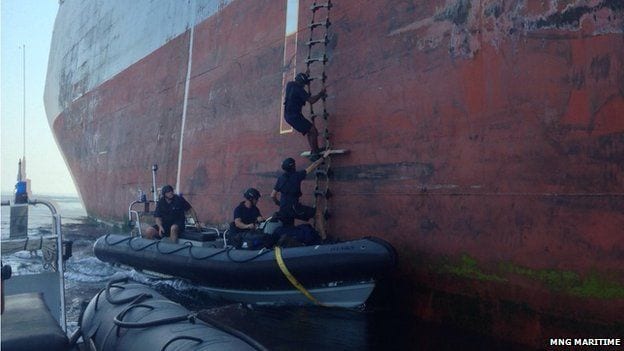
Floating Armouries and the law
In general, there are three aspects of an FA operation to which existing laws apply:
- The vessel and its armoury
- The services facilitated by the vessel
- The individuals involved
The Individuals Involved
There are three main legal and regulatory angles regarding the people involved in FA operations: labour laws, arms trading laws, and long arm laws.
The Maritime Labour Convention
The Maritime Labour Convention (MLC) was born of an international legal effort to bring together the tenets of SOLAS and UNCLOS and provide a safe and secure workplace, fair terms of employment, decent working and living conditions for all seafarers.
As seafarers, the crew of an FA should be protected under the MLC. The PMSC personnel who are accommodated on an FA are, on the other hand, a different matter. While PCASP are on task, flag states usually consider them supernumeraries. The MLC only applies to crew, so likely would not apply to the PCASP on their client vessels.
While on the FA, on the other hand, the PCASP personnel are considered either passengers or “industrial personnel” – an IMO category for Special Purpose Vessels – meaning that the MLC does not apply to them. The MLC’s applicability to FAs, therefore, is limited to the crew of the FA.
In accordance with the MLC Seafarers are subject to a range of regulations including:
- Minimum age requirements for seafarers to work on a ship
- Conditions of employment
- Accommodation, recreational facilities, food and catering standards
- Health protection, medical care, welfare and social security protection
- Compliance and enforcement
- The current flag States for FAs that have registered FAs and ratified the MLC are Mongolia and Saint Kitts and Nevis; Djibouti and Sierra Leone are not signatories of the MLC.
MLC 2006 Article II
- Except as expressly provided otherwise, this Convention applies to all seafarers.
- In the event of doubt as to whether any categories of persons are to be regarded as seafarers for the purpose of this Convention, the question shall be determined by the competent authority in each Member after consultation with the shipowners’ and seafarers’ organizations concerned with this question.
- Except as expressly provided otherwise, this Convention applies to all ships, whether publicly or privately owned, ordinarily engaged in commercial activities, other than ships engaged in fishing or in similar pursuits and ships of traditional build such as dhows and junks. This Convention does not apply to warships or naval auxiliaries.
- In the event of doubt as to whether this Convention applies to a ship or particular category of ships, the question shall be determined by the competent authority in each Member after consultation with the shipowners’ and seafarers’ organizations concerned.
- Where the competent authority determines that it would not be reasonable or practicable at the present time to apply certain details of the Code referred to in Article VI, paragraph 1, to a ship or particular categories of ships flying the flag of the Member, the relevant provisions of the Code shall not apply to the extent that the subject matter is dealt with differently by national laws or regulations or collective bargaining agreements or other measures. Such a determination may only be made in consultation with the shipowners’ and seafarers’ organizations concerned and may only be made with respect to ships of less than 200 gross tonnage not engaged in international voyages.
Arms Trading Laws
A number of international laws have provisions that apply to individuals relating to arms trading. While the ATT and the Protocol to the Palermo Convention have been discussed extensively above, the requirements of the ATT (article 10) and the Firearms Protocol (article 13) that states regulate brokering are particularly relevant to FA operations. The bookings and facilitations that occur on an FA could be considered brokering under the arms trading laws and may therefore be regulated under the national laws of either the individuals or the flag state. The concepts of “third country brokering” and “extraterritorial brokering” appear in some national laws and are particularly applicable to FA operations where nationals of different states engage in brokering activities on a vessel flagged in a state of which none of the individuals are citizens.
Protocol to Palermo:
Article 15. Brokers and brokering
- With a view to preventing and combating illicit manufacturing of and trafficking in firearms, their parts and components and ammunition, States Parties that have not yet done so shall consider establishing a system for regulating the activities of those who engage in brokering. Such a system could include one or more measures such as:
(a) Requiring registration of brokers operating within their territory;
(b) Requiring licensing or authorization of brokering; or
(c) Requiring disclosure on import and export licences or authorizations, or accompanying documents, of the names and locations of brokers involved in the transaction.
- States Parties that have established a system of authorization regarding brokering as set forth in paragraph 1 of this article are encouraged to include information on brokers and brokering in their exchanges of information under article 12 of this Protocol and to retain records regarding brokers and brokering in accordance with article 7 of this Protocol.
Long Arm Laws
As noted, some national laws attach to the citizenship of the individual beyond the territorial limits of the state. Laws and regulations relating to criminal activity, arms trading, and other matters may therefore apply to certain individuals on FAs by virtue of their nationality alone. Enforcing those laws would be the exclusive responsibility of the state in question, but it is possible that one individual could be guilty of having broken his national law on board an FA even if his colleagues identical activities were not considered illegal under their own country’s laws.

